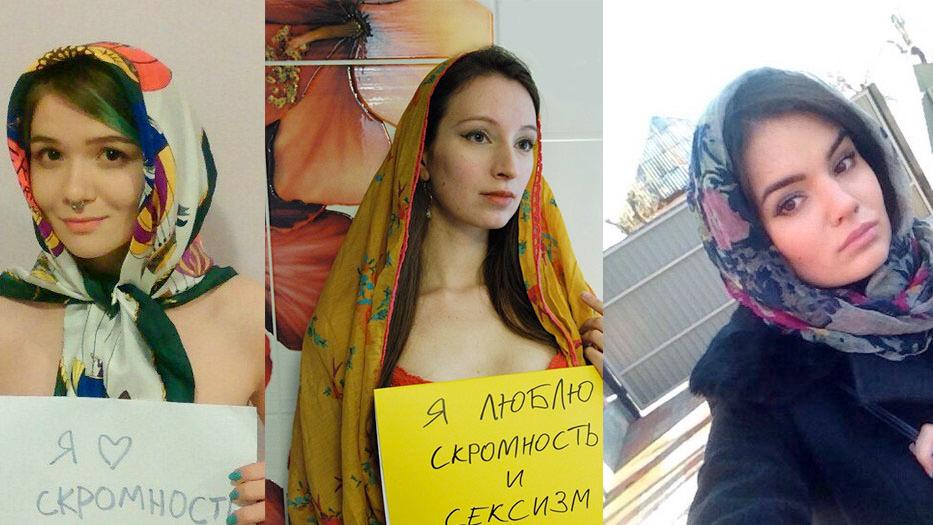Conservative group launches ‘modest dress’ contest for women. What could possibly go wrong?
A small collection of the submissions to the “Russian Beauty” contest (from both competitors and protesters).
When a conservative group on Russia’s most popular social network held a beauty contest to celebrate female “modesty,” the results were anything but.
Women wishing to enter the Russian Beauty competition had been asked to submit photos of themselves wearing headscarves. The contest prompted a flashmob against what some called the competition’s chauvinism and sexism.
The host of the competition was a group called Parliamentary League, a debate club affiliated loosely with the Duma (the lower house of Russia’s parliament). “We think women’s best accessory is modesty,” the group explained, “which is why the main condition of this contest is that applicants must wear a scarf in their photos.”
Immediately, users on the VKontakte social site began criticizing the Parliamentary League’s decision to make modesty and headscarves the focus of its contest. Women, as well as a few men, started entering the competition with photographs of themselves wearing headscarves and holding signs reading, “Without modesty and without sexism,” and (ironically) “I love modesty and sexism.” Many women, presumably riffing on the “modesty” theme, exposed generous amounts of cleavage, while a least one woman posed entirely naked, except for her headscarf.
Parliamentary League started deleting the provocative submissions, prompting several of the beauty contest’s critics to write open letters to the group explaining their opposition to a celebration of female modesty for International Women’s Day.
Inna Denisova, one of the first people on VKontakte to start using the hashtag #этонедебаты (#TheseArentDebates), explained her objections in a blog post. "The organizers think a girl should be modest," Denisova wrote. "No, my friends, a girl at most should call her parents once a day and brush her teeth in the morning and at night (if she wants to. Every one of us … has the right to be whomever we want in this world.''
Responding to a complaint about the beauty competition on its community wall, Parliamentary League administrators defended the contest as a legitimate, if conservative, endeavor. "We’re supporting an image of modest girls that we think is right and something worth spreading throughout Russia,'' they wrote.
RuNet Echo spoke to Yekaterina Buller, one of the contest’s winners, about the scandal surrounding the competition’s alleged sexism. Buller echoed many of the sentimentsParliamentary League expressed, denying that the contest was at all sexist, and accusing critics of being either ignorant or “stupid.”
"What do these “critics” think was patriarchal? I wouldn’t call it that, but even if that’s the right word, what would be so bad? All the cultures of the world value a modest and chaste vision of women, wives, mothers, and guardians of tradition,'' Bulier said. "In today’s reality, amid society’s moral decay, I think it makes sense to remember this [traditional] position. I don’t blame the feminists or the other groups, but I don’t consider myself one of them. All these discussions about this issue are just a consequence of our (contemporary youth’s) absence of clear concepts of good and evil, and a result of the false values imposed by pop culture."
This isn't the first scandal involving Parliamentary League, which in late February invited [12] Russian Orthodox activist Dmitry “Enteo” Tsorionov to lecture during a debate about banning abortion in Russia. Enteo is known for radical, often violent demonstrations against gays, Muslims, and other groups. The debate community has also welcomed members of the right-wing LDPR youth wing to an event to discuss amending the Russian Constitution and re-implementing an official state ideology.
This story was adapted from Global Voices Online, a group of 1,200 bloggers, translators and editors worldwide.
We want to hear your feedback so we can keep improving our website, theworld.org. Please fill out this quick survey and let us know your thoughts (your answers will be anonymous). Thanks for your time!
